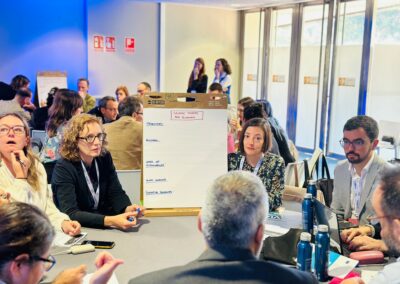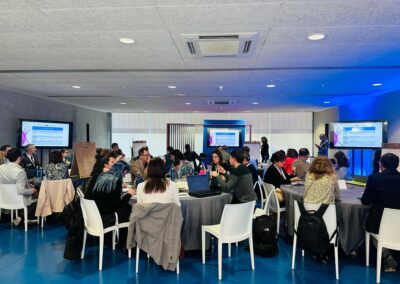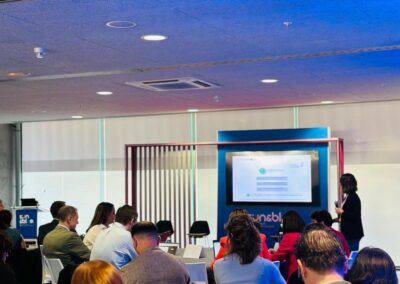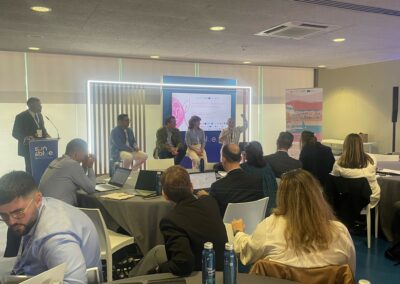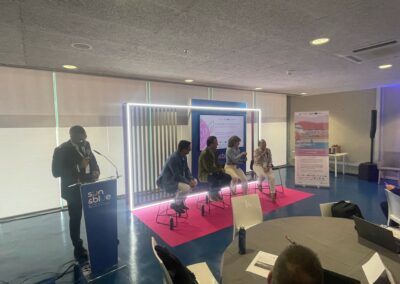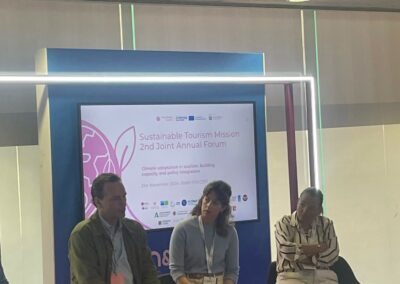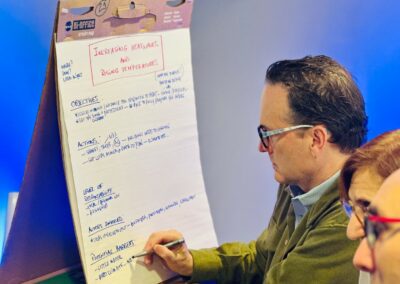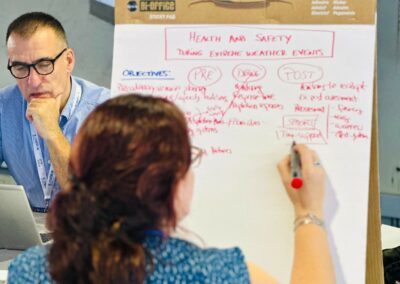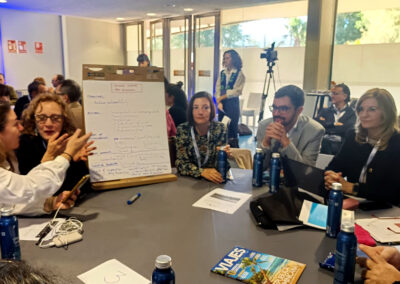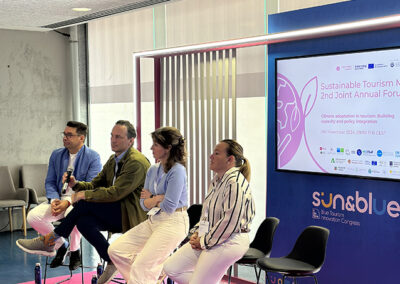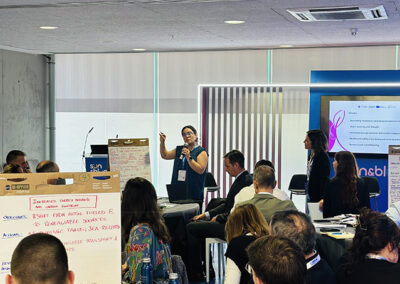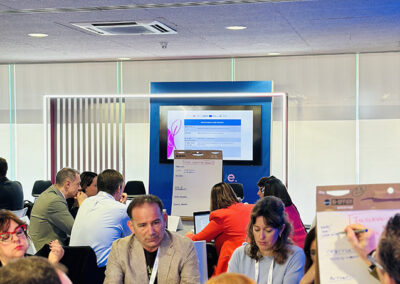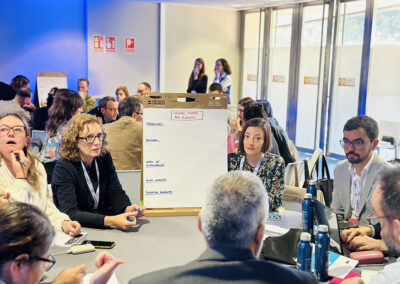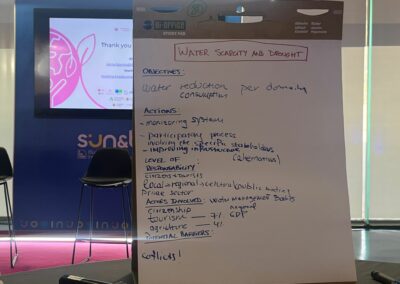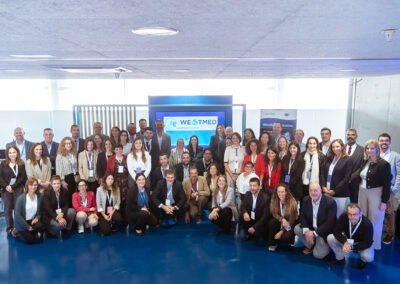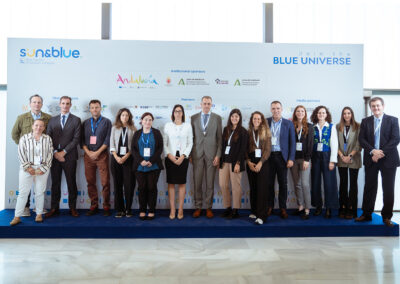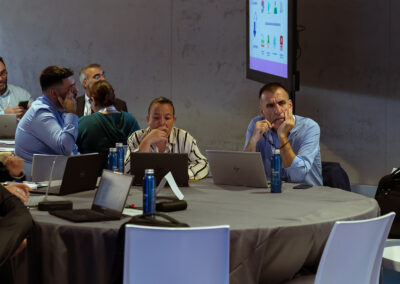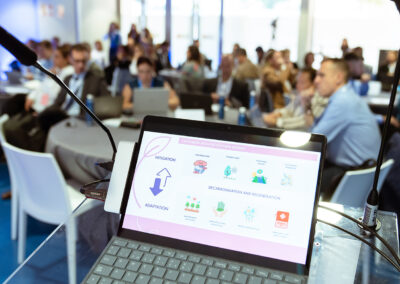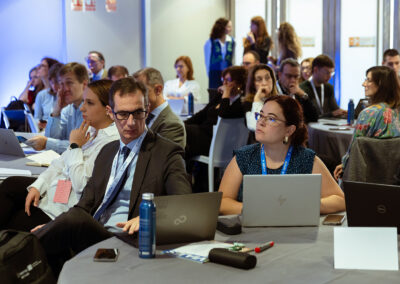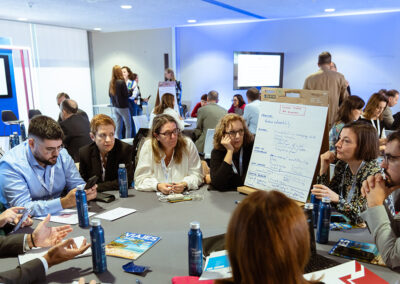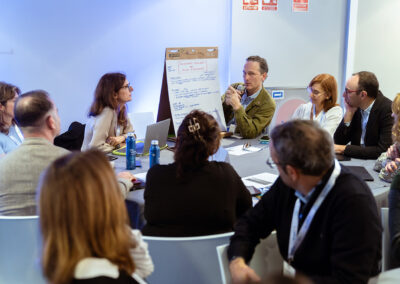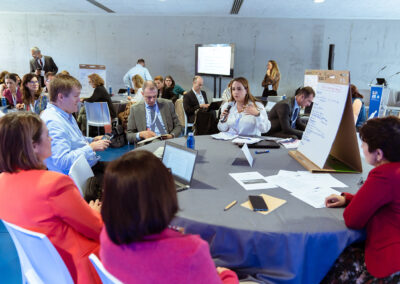
The Interreg Euro-MED Sustainable Tourism Mission 2nd Joint Annual Forum (JAF), titled Climate Adaptation in Tourism: Building Capacity and Policy Integration, took place on November 21st, as a side event during the Sun&Blue Blue Tourism Innovation Congress in Almería, Spain. More than 50 participants, primarily regional authorities and DMOs, took part in this 2nd edition of the JAF. This forum, organized by C4T and D4T Projects under the umbrella of several events related to “Sustainable Tourism in the Mediterranean,” was notably held alongside the launch meeting of the WestMED Technical Group on Sustainable Tourism.
Capacity-Building around the creation of Tourism Climate Action Plans
A key component of the forum was the Capacity-Building Session, led by the Travel Foundation, which aimed to equip participants with practical knowledge and actionable insights on climate action planning for the tourism sector.
The first part of the Capacity-Building Session explored the importance of climate action plans in tourism, focusing on the Glasgow Declaration on Climate Action in Tourism and the Blueprint for Tourism Climate Action Plans: A Guide for Regional Authorities and Destination Management Organizations (DMOs), developed by the Travel Foundation under the Community4Tourism project, with coordination from the two European networks, CPMR-IMC and NECSTouR. Participants were introduced to the role of Regional Tourism Authorities and destinations in climate action planning, as well as the key stages of developing and implementing climate plans.
The interactive part of the session allowed participants to work in small groups to apply climate action planning to real-life scenarios. Each group was tasked with addressing one of five climate challenges affecting tourism: Increasing Heatwaves and Rising Temperatures, Water Scarcity and Drought, Health and Safety Risks from Climate Extreme Events, Severe Storms and Flooding and Increased Energy Demand and Carbon Footprint.
Using a prepared case study based Almería’s unique environmental context, participants prioritized actions and discussed mitigation and adaptation strategies to reduce climate impacts. Key aspects covered included objectives, actions, stakeholder engagement, level of responsibility and the identification of potential barriers and challenges to achieving the proposed climate goals.
The capacity building exercise concluded with a joint presentation from the different groups. For example, a group addressed energy demand and carbon footprint, recommending a shift to renewable energy sources, sustainable transport, and involvement from local stakeholders. Another group tackled heatwaves, proposing Nature-Based Solutions like shading and trees, alongside adapting the tourist season based on local climate data. These discussions highlighted the importance of collaboration across levels of government and the private sector to address climate challenges in tourism.
The session successfully equipped participants with practical tools to advance climate action in tourism and foster policy integration across regions.
Policy debate on climate change’s effects on tourism
The Policy Debate Adapting and Mitigating Climate Change on Tourism: Strategies and Policies during the second part of the 2nd Joint Annual Forum explored visions for the future on this key challenge we address. Ioannis Mardikis from the European Public Law Organisation (Greece), a partner of the Dialogue4Tourism Project, moderated this high-profile policy debate. The discussion delved into the far-reaching impact of climate change on tourism, with a specific focus on the Mediterranean Basin.
Participants from Malta, Belgium, France and other regions, including representatives from initiatives such as WestMED blue economy initiative , NECSTouR, World Ocean Council and Plan Bleu shared insights grounded in their areas of expertise. They explored in a dynamic approach climate change’s effect on tourism, potential adaptation and mitigation strategies, the future of smart destinations and the blue economy.
Robin Degron, Director of Plan Bleu, highlighted the alarming rise in global temperatures, emphasizing that the planet will face a 3°C to 6°C increase within the end of the century, with a particular hotspot in the Mediterranean. “The climate is under immense stress, and we’re in a battle for adaptation. The war on climate adaptation is happening now, and tomorrow is crucial,” Degron stated, urging the simultaneous pursuit of adaptation and mitigation strategies.
Vulnerability of small islands
Stephanie Vella, representative of the National Hub of Malta for WestMED, underscored the unique vulnerabilities faced by small islands like Malta, where tourism contributes 20% of GDP while crucial sectors of the economy providing resilience (i.e. traditional agriculture) have shifted to tourism. She pointed out the pressing challenges, including the reliance on imports and risks to coastal infrastructure. Mrs. Vella advocated for diversifying tourism sectors and prioritizing quality tourism as a pathway to resilience.
She also emphasized the need for Southern Mediterranean countries to unite, alongside public and private stakeholders, to tackle shared challenges. “Collaboration across the region is key to creating sustainable projects that benefit the Mediterranean as a whole,” she said.
Marjan Nauwelaert, chairperson to Climate Task Force (NECSTouR) highlighted the effects of climate change in Northern Europe, citing severe flooding in Belgium in 2021 as an example. She introduced the term “water bombs” that caused floods in Flanders area and started to be observed in many other territories as well. Predicted increases in wind intensity pose risks to tourism activities such as cycling. Mrs. Nauwelaert called for national-level climate mitigation efforts and proposed several solutions, including climate-resilient urban planning, nature-based solutions for coastal protection, and diversifying tourism offerings to reduce dependence on peak summer months.
Public-private entities’ shared responsibilities
Stewart Sarkozy-Banoczy, managing director of World Ocean Council, highlighted the cascading effects of climate change and the urgent need to address both stresses and solutions simultaneously. The role of the private sector in climate adaptation and mitigation was debated. While private companies are willing to contribute, participants raised critical questions about financing these efforts. This pending method of financing remains a pressing issue in the privatization of climate resilience measures.
The discussion also focused on collaborative efforts like the NECSTouR Climate Task Force, which unites regions advancing climate action in tourism as well as the WestMED Sustainable Tourism technical stakeholders’ group. Participants examined strategies for implementing the Green Deal within the tourism sector.
The panel agreed on the importance of expanding cooperation across sectors, implementing actionable policies, and fostering innovation to ensure tourism remains sustainable in the face of climate challenges. At the same time, underscored the urgency of addressing climate change impacts on tourism, with a shared commitment to building a resilient and sustainable future for the sector.


